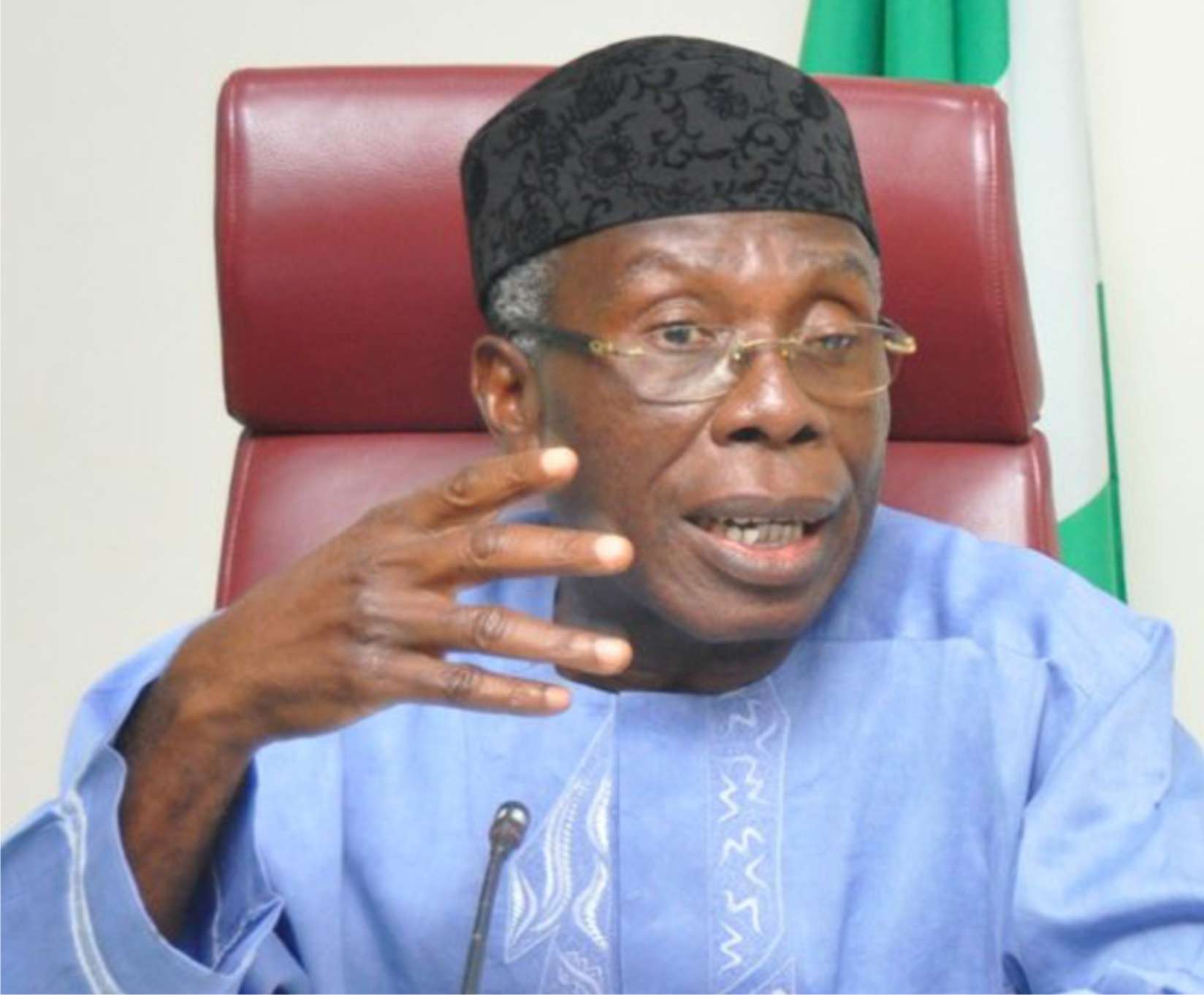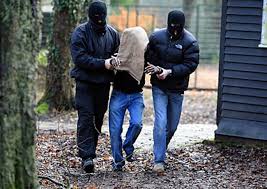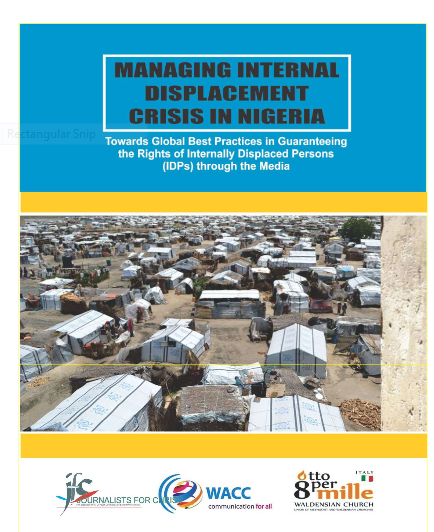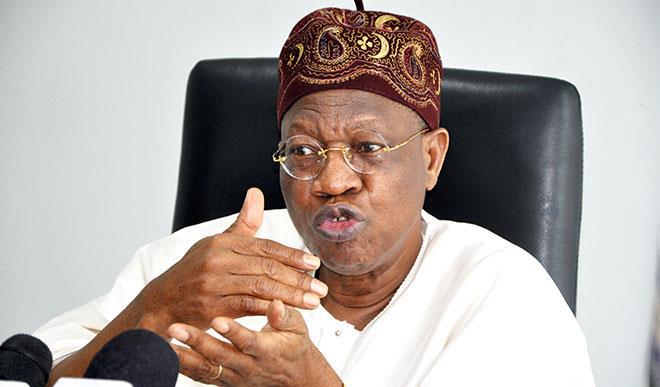As Audu Ogbeh Takes the Back Seat

By Eric Teniola
When President Muhammadu Buhari, GCFR, submitted his list of Ministers to the Senate on July 23, the name of Chief Audu Innocent Ogbeh (72) was missing. He was one of the few ministers who was not re-nominated by the President. And this led to a conclusion that, perhaps, the public service career of this colourful politician is over and that henceforth he will retire to his village in Efugu-Otukpa with his wife, Justina Obehi and take the back seat with a role as an elder statesman. If that should be, it is not too early to thank Chief Ogbeh for his contributions to Nigeria.
No doubt Chief Audu Ogbeh now has a passport to join the league of Benue state greats including Chief Jacob Obade, the Minister of State in charge of the Nigerian Army in early sixties who recruited most military officers from that zone, Chief Joseph Sarwuan Tarka (1932-1980) who formed the United Middlebelt Congress at the age of 23 along with Chief Isaac Shaahu and others. He became a leader of the region till he died and Colonel Joseph Akahan, the Chief of Army Staff from Gboko, who died in an helicopter crash during the civil war at the age of thirty-one in May 1968. Others with similar passports are Brigadier General David Bonaventure Alachenu Mark (71) from Otukpo, Major General (rtd.) Lawrence Anebi Oloja (70) from Idekpa, Okpiko, Chief George Akume (65) from Wannune Tarka, Major General Chris Abutu Garba (71) from Ipole, Senator Daniel Iyorkegh Soror, Brigadier Atom Kpera (78) Chief Barnabas Adyar Iyoriher Gemade from Otukpo, Chief Iyorchia Ayu (66) from Gboko, Chief Ameh Ebute from Ugbokodo, Ambassador Iyorwuese Hagher (70) from Kasar, Chief Paul Unongo from Turan, Brigadier General (rtd) Emmanuel Ikwue from Otukpo, Chief Isaac Shaahu and a few others.
Chief Audu Ogbeh’s life reminds me of what James Baldwin wrote, “Not everything that is faced can be changed but nothing can be changed until it is faced”.
The name Audu Ogbeh caught National attention in 1979 when he was elected as deputy speaker of the Benue state House of Assembly. On October 18, 1979, President Shehu Usman Aliyu Shagari submitted 31 names to the Senate for ministerial confirmation. Benue state had two cabinet nominees, Chief Isaac Shaahu and Chief Paul Unongo. Chief Shaahu was of the NPN at that time. In 1981 there were some allegations made against the then Minister of Power and Steel, Chief Paul Iyorpuu Unongo (82) then of the NPP, who is also from Benue state. At that time the NPN was in control of Benue state and the then governor, Chief Aper Aku (1938-1988) from Ikyobo, Ushongo local government area of Benue state was of the NPN. Notable politicians from Benue state including my good friend Senator Joseph Sarwuan Tarka, Senator Suemo Chia, Senator Ameh Ebute, Chief Isaac Shaahu, Dr Emmanuel Atanu, V. Iortim, S.O. Adohi, Chief B.A. Chaha and others were also of the NPN.
Following the allegations on Chief Paul Unongo, President Shagari dropped him from the cabinet and appointed Chief Audu Ogbeh as Minister of Communication at the age of 33. President Shagari later moved him to the Ministry of Power and Steel. It was at this time that I knew Chief Audu Ogbeh who was introduced to me by his bosom friend, Chief Innocent Adikwu, who was then Editor of THE SUNDAY PUNCH. He was also introduced to me later by my colleague and friend, Mr Muyiwa Adetiba, a gifted writer, who was then a star in the Punch Newspaper who later became Editor of THE SUNDAY PUNCH. In his first term he was loyal to President Shagari and he did his job brilliantly.
On October 17, 1983 he was re-nominated by President Shagari as a minister in his second term. Only seven of them were re-nominated. And they were Chief Eteng Okoi Obuli (Cross River), Mohammed Ibrahim Hassan (Bauchi), Alhaji Ali Baba (Gongola), Alhaji Umaru Abdurahman Dikko (Kaduna), Alhaji Adamu Ciroma (Borno) and Chief Audu Ogbeh (Benue) and Dr. Ishael Jikiri Igbani (Rivers). The rest were freshers. They included Chief Eleazar Chukwuemeka Anyaoku, Chief John Nwodo jnr., Alhaji Sule Katagum, Alhaji Ibrahim Tahir, Alhaji Magaji Mu’azu, Chief J.A. Orhorbo, Mr. Ralph Uwechue, Dr. E.T. Atanu, Alhaji Muhammadu Buhari, Alhaji Haliru Dantoro, Dr. Simi Johnson, Dr. Idirisu Ibrahim, Chief Kehinde Sofola, Dr. Bode Olowoporoku, Chief S.M. Afolabi, Dr. Bimbo Akintola, Alhaji Hassan Mohammed, Mr. Robert Doshun Gumut, Chief Okoi-Obuli, Dr. A.J. Okonno, Alhaji Ali Baba, Mr. Paul Wampana, Chief Emmanuel Adiele, Alhaji Isma’ila Isa, Alhaji Yusuf Maitama Sule, Alhaji Hamisu Musa, Dr. Ishmael Igbani, Mrs. E. Diete-Spiff, Alhaji Muhammadu Lugga, Alhaji Idirisu Koko and Alhaji Bala Sokoto.
On December 31, Major General Muhammadu Buhari toppled President Shehu Shagari. Chief Ogbeh went back to his farm in Benue state. He is Idoma. The Idomas are people that primarily inhabit the lower western areas of Benue State, Nigeria, and kindred groups can be found in Cross Rivers State, Enugu State and Nasarawa State in Nigeria. The Idoma language is classified in the Akweya subgroup of the Idomoid languages of the Volta–Niger family, which include Alago, Agatu, Etulo and Yala languages of Benue, Nasarawa and Northern Cross river states. . The Akweya subgroup is closely related to the Yatye-Akpa sub-group. The bulk of the territory is inland, south of river Benue, some seventy-two kilometers east of its confluence with river Niger. The Idomas are known to be ‘warriors’ and ‘hunters’ of class, but hospitable and peace-loving. Other tribes in Benue state are Tiv, Igede, Etulo, Abakpa, Jukun, Hausa, Igbo, Akweya and Nyifon.
He returned to full time farming in December 1984. During the period, he set up a number of personal projects including Medium Scale Rice Mill, 14,000 Tree Cashew Plantation and a Poultry Farm.
He also consulted for several state governments and established a number of notable projects, including a large scale pineapple project for Cross River State and 2 rice mills – for the Family Economic Advancement Program in Abuja and for General Jeremiah.T. Useni in Langtang, Plateau State.
While in full time agriculture, he answered the call to serve and was appointed to the 19 member National Constitutional Conference Commission in 1993. He was later appointed to the eight-man National Reconciliation Committee which was inaugurated on December 28, 1995 under the leadership of my former teacher, Chief Alexander Opeyemi Akinyele, the Loboshin of Ondo Kingdom. General Sani Abacha inaugurated the committee with a view towards full reconciliation among Nigerians. He later dissolved the committee.
In 1998, he directed the presidential campaign of Dr. Alex Ekwueme, under the PDP and became a full time member of the party, which won the elections in 1999.
He is also a member of Eisenhower Exchange Fellowships Incorporated, based in Philadelphia, United States of America. He has written five plays which include three published works. One of his plays, the Epitaph of Simon Kisulu was staged at Muson Center in 2002.
The brutal politics in Benue state almost took his life as he was attacked by hired assassins and was presumed dead after the attack in 1999.
On November 11, 2001, Chief Audu Ogbeh succeeded his Benue state colleague, Chief Bernabas Germade, who in November 1999 defeated Chief Sunday Awoniyi as Chairman of the party. Chief Audu Ogbeh’s term as chairman was tumultuous. The puzzle I still don’t understand till now is why President Obasanjo picked on Chief Ogbeh to be the National chairman when in 1998 he was the campaign manager of Chief Alex Ekwueme in his Presidential bid at the Jos Convention.
Chief Ogbeh reorganized the party and ensured the party’s victory in the 2003 election. From day one we knew that the marriage between President Obasanjo and Chief Audu Ogbeh can’t work. One grew up in a military constituency where 100% total loyalty to your boss wrong or right is required while the other grew up in a rather free world of ideas where you can agree and disagree on principles. The gubernatorial election in Anambra state in 2003 and other crises exposed the division between the two men.
Shortly after the Presidential election in 2003 he was faced with a difficult decision either to support President Obasanjo’s third term bid or to abide by the constitution provision which allows any individual to serve only two terms. The decision he took became risky. Towards the end of his tenure and with his increasingly vocal denunciations against the excesses of the Obasanjo administration, he came into conflict with the president.
Chief Audu Ogbeh’s family was harassed and subjected humiliation and embarrassment. His wife, Justina Obehi Ogbeh from Ekpoma in Edo state and his five children were not spared in the ordeal.
In a letter dated December 6, 2004 he told President Obasanjo to do something about it. “About a month ago, the nation woke up to the shocking news of a devastating attack on Anambra State, resulting in the burning down of radio and television stations, hotels, vehicles, assembly quarters, the residence of the state chief judge, and finally, Government House, Awka. Dynamites were even applied in the exercise; and all, or most of these actions, in the full glare of our own police force, were shown on the NTA for the world to see. The operation lasted three days. That week, in all churches and mosques, we, our party, and you as head of government and leader of this nation, came under the most scathing and blithering attacks. We were singly and severally accused of connivance in action and so forth. Public anger reached its peak. You set up a reconciliation committee headed by the Ebonyi State governor, Dr. Sam Egwu, and we all thought this would help calm nerves and perhaps bring about some respite. But quite clearly, things are nowhere near getting better. While the reconciliation team attempted to inspect damaged sites in Anambra, they were scared away by gunfire, further heightening public anger and disdain for us. Bomb explosion in Government House, Awka On Tuesday, the 30th day of November, 2004, there was another shocking development – a reported bomb explosion in Government House, Awka. Since then, the media, public discourse within and even outside of our borders, have been dominated by the most heinous and hateful of expletives against our party and your person and government. It would appear that the perpetrators of these acts are determined to stop at nothing since there has not been any visible sign of reproach from law enforcement agencies. I am now convinced that the rumours and speculations making the rounds that they are determined to kill Dr. Chris Ngige may not be unfounded. The questions now are: What would be the consequences of such a development? How do we exonerate ourselves from culpability? Worse still, how do we even hope to survive it? Mr. President, I was part of the Second Republic and we fell. Memories of that fall are a miserable litany of woes we suffered, escaping death only by God’s supreme mercy. Then we were suspected to have stolen all of Nigeria’s wealth. After several months in prison, some of us were freed to come back to life penniless and wretched. Many have gone to their early graves un-mourned because the public saw us all as renegades. I am afraid we are drifting in the same direction again. In life, perception is reality, and today, we are perceived in the worst light by an angry, scornful Nigerian public for reasons that are absolutely unnecessary. Mr. President, if I write in this vein, it is because I am deeply troubled; and I can tell you that an overwhelming percentage of our party members feel the same way, though many may never be able to say this to you for a variety of reasons. But the buck stops at your table, and in my position, not only as chairman but also as an old friend and loyal defender of your development programmes, which I have never stopped defending, I dare to think that we can, either by omission or commission, allow ourselves to crash and bring to early grief, this beautiful edifice called democracy. On behalf of the People’s Democratic Party, I call on you to act now and bring any, and all criminal, even treasonable activity to a halt. You and you alone have the means. Do not hesitate. We do not have too much time to waste.”
Obasanjo’s response on December 12, 2004 was laced with bile even from the first paragraph where he wrote: “I am amused and not surprised by your letter of December 6, 2004 because after playing hide and seek games over a period of time, you have finally, at least in writing, decided to unmask and show your true colour.” Ogbeh refused pressures to resign from office and throughout the yuletide holidays of 2004 the nation was kept agape by the standoff between the party chairman and the president.
In early January, not even a reconciliatory lunch of pounded yam was enough to reconcile the two men and Ogbeh finally resigned following apprehensions about his life. The fact that the resignation was announced by President Obasanjo’s spokesperson, Mrs. Oluremi Oyo, gave credibility to the rumour that Chief Audu Ogbeh resigned under duress.
He claimed later that he resigned only to avoid conflict within the party, and due to a desire to return to farming. He handed to someone from President Obasanjo’s military constituency, Colonel (rtd.) Ahmadu Adah Ali (82) of the ALI MUST GO FAME, who was Minister of Education between 1978 and 1979 during the tenure of General Olusegun Obasanjo as Head of State.
In December 2005, he formally resigned from the PDP. It was not until 2015 that he joined the All Progressive Congress (APC) as a pioneer member. In November 11, 2015 President Muhammadu Buhari appointed him Minister for Agriculture and Rural Development.
In March last year, he lost his brother, Michael and this affected him seriously for they were very close since they both lost their parents Pa Ogbeh Ejembi and Madam Egbi Ogbeh nee Odinya.
In the last three and half years, his work in the Ministry of Agriculture has been commendable.
The political obituary of Chief Audu Ogbeh is yet to be written. Deputy Speaker, National Chairman of a ruling party, three-term Minister, these are notable achievements of a worthy public servant.
Eric Teniola, a former Director at the Presidency wrote from Lagos.




Fidelis Mac-Leva says:
This piece is interesting, especially given its attempt to provide anecdotal historical background of some great Benue politicians. But there are some factual errors to which attention must be drawn. For instance, Chief Barnabas Gemade was referred to as someone from Otukpo. He is from Konshisha and NOT Otukpo.
Also the writer said “Other tribes in Benue state are Tiv, Igede, Etulo, Abakpa, Jukun, Hausa, Igbo, Akweya and Nyifon…. Again it is not true to say that IGBO, HAUSA, AKWEYA and NYIFON are tribes from Benue State.